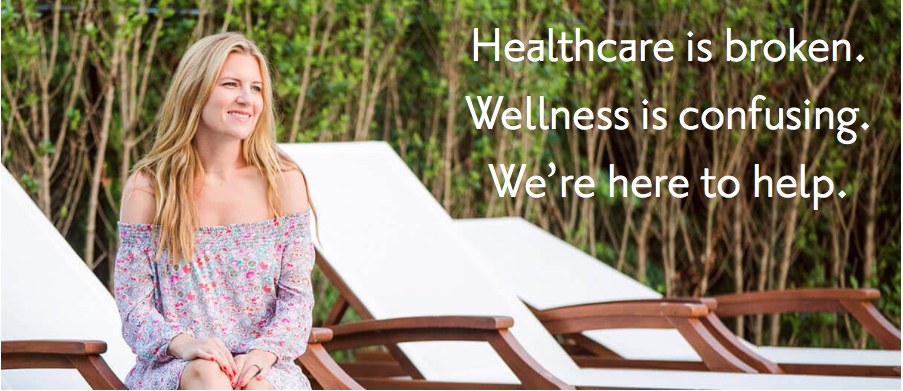It’s important to remember that we can’t “see” all illnesses or health struggles. For example, mental illness is something we often can’t pick up on just by looking at a person. What’s more, mental illness can also impact caregivers, family members, and friends of people living with it. Naturally, that experience can trickle into someone’s work life.
As a board-certified patient advocate, speaker and the founder of WellBe, a media and e-learning company, and lifestyle brand focused on bridging the gap between the healthcare system and the wellness movement, my mission is to help people prevent and reverse chronic health issues naturally.
As a young patient living with chronic Lyme Disease and Amenorrhea, I learned early on how difficult it can be to navigate the healthcare system and get access to treatments that address the root cause of illness. It was later serving as a caregiver for my mother, who struggled with Schizoaffective Disorder and eventually took her own life, where I opened my eyes to the serious toll that caregiver burnout can have and how to provide better support.
It can be tough to juggle your career with taking care of a loved one struggling with an illness, but here are FOUR steps you can take to help navigate the process more easily.
Adrienne Nolan-Smith is the founder of WellBe and The Spark WellBe Program.
Research Your Options
In the workplace, I highly recommend being transparent with your employer and also exploring what resources like time off are available to you. Familiarize yourself with what your company may offer. Because these options may be, buried in HR documents if you’re struggling to find the information you need, reaching out to an HR person can help streamline the process.
Get Creative
I think the best thing to do is, if you’re working and also have other people you’re responsible for on the side, you have to get creative. I told my boss I was working from home and would sometimes have to work from Boston, where my mom was living before she died. I think the more transparency you can give the better, so others know it’s not just you slacking off.
Be Kind To Yourself
It’s normal to go through phases where you feel like you’re leaning more to one side (caregiving vs career). You have to realize that’s it’s not that you’ve stopped caring—it’s that you’re so tired. Think of it more like burnout or fatigue or a blip in the road where for a few weeks or months, you’re not as ferocious a caretaker as you need to be. You will get back into that and feel inspired again. If you notice someone on your team is struggling with caregiver burnout, offer to pick up the slack a bit or even just provide encouragement and remind them that everybody gets tired and to not feel guilty.
Schedule In Self-Care
In terms of self-care, I remember thinking I had no time for myself. Though my brothers and uncle were also a great support to her mom, I still struggled with guilt when I made plans outside of working or taking care of my mom. Any time I had outside my job, I felt I should have spent researching or taking care of my mom. It’s easy to run yourself down when you don’t take care of yourself. However, I learned that if you don’t do anything for yourself, you’re not going to be there for anyone else and can’t care for anyone. And remember everyone has their own version of self-care. You know what it’s like when you are doing something great for yourself that you love. Schedule it in your calendar so it’s like an appointment with yourself. You wouldn’t want to not show up for people you care about, and you need to show up for yourself.
Most importantly, we all know that taking care of ourselves is absolutely essential to our mental and physical well-being. At WellBe, we also know that caregivers have even less personal time and are often completely exhausted and overwhelmed. There are so many things you think you should be doing that you don’t know where to start, so you do nothing.
I encourage caregivers to just take one step or to make just one investment in themselves and that will set off a chain of other good decisions. Consider signing up for The WellBe Spark Health Program, a 1-hour a week webinar e-learning course, which in January will lead people through the step-by-step process of making research-supported lifestyle changes to detoxify their home and daily habits so that by the end of the 8 weeks, not only will they feel and look their best, but they’ll have the peace of mind that their lifestyle choices are now sparking health, and not contributing to chronic health issues or disease risk. A non-toxic home and making sure most of your daily lifestyle habits are nourishing to your mind, body, and soul are some of the most important things you can do for the person you’re caring for.
Lastly, remember to lead with empathy and not frustration. I know that may be hard at times, but when you see your caretaking role as an honor, rather than a burden, your attitude towards your loved one and the amount of burnout you feel will begin to decrease.
Adrienne Nolan-Smith- Board Certified Patient Advocate – Speaker – Founder of WellBe & The WellBe Spark Health Program


